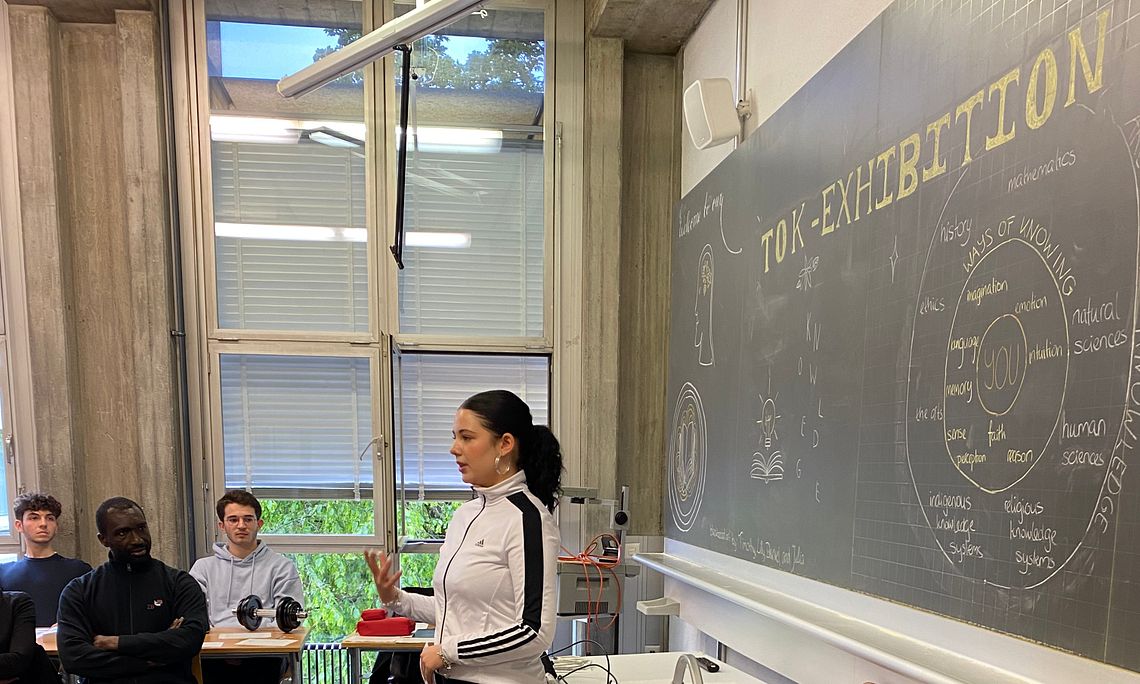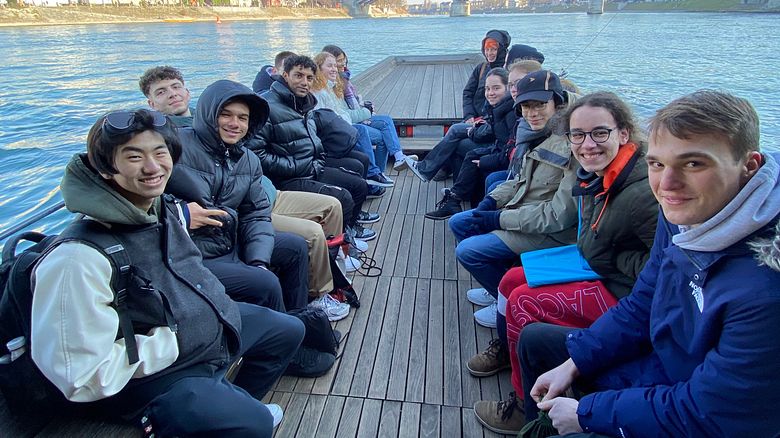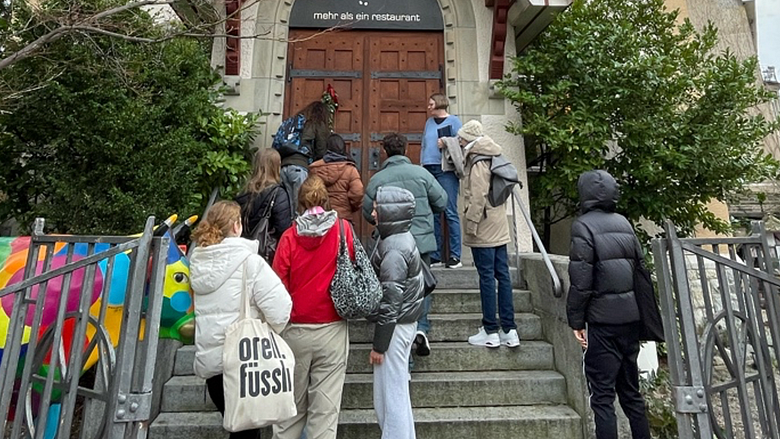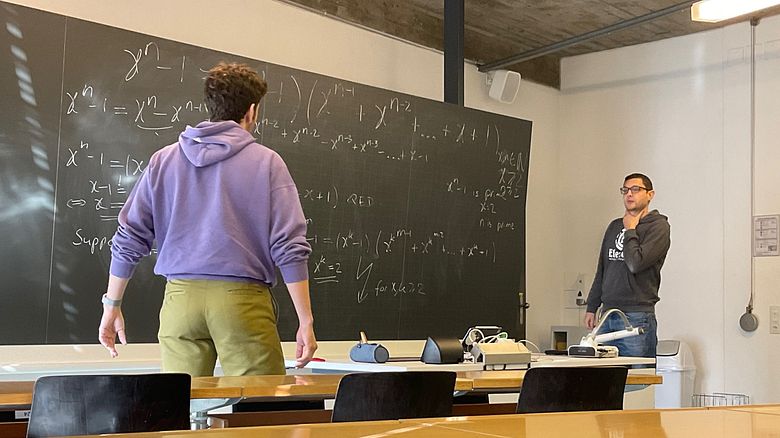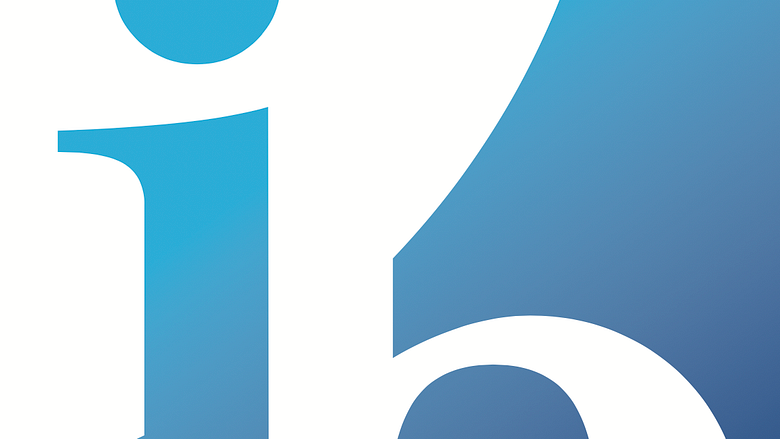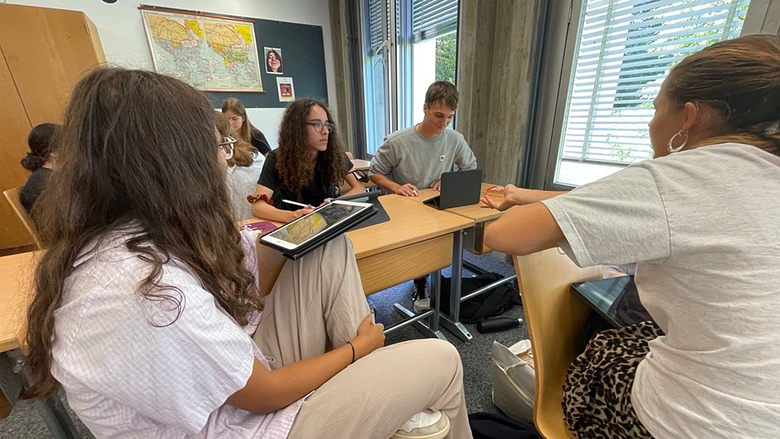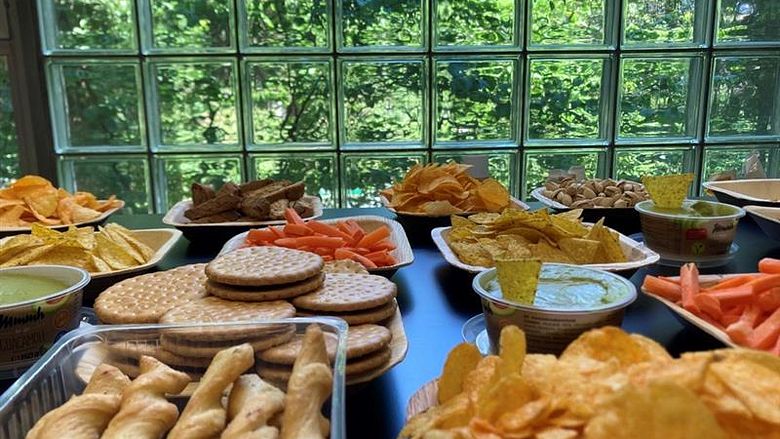
Das IB-Jahr am LG
Bis die Schülerinnen und Schüler der 6i ihr IB-Diplom in den Händen halten, durchlaufen sie über zwei Jahre ein vielfältiges Schulprogramm, zu welchem diverse Projekttage und -wochen gehören. Ein Einblick:
Der IB-Diplomlehrgang ist ein zweijähriges Programm für die Oberstufe von Mittelschulen. Die Philosophie der IB-Organisation deckt sich weitgehend mit jener der schweizerischen Maturität: Eine ausgewogene Allgemeinbildung ist das zentrale Anliegen. Speziell stark gewichtet werden im IB die Internationalität und das Verständnis für fremde Kulturen und Denkweisen.
Das Literargymnasium Rämibühl ist eine der beiden öffentlichen Kantonsschulen im Kanton Zürich, die den Doppelabschluss IB / Matura anbieten. Die Schülerinnen und Schüler der IB-Klassen erlangen am Ende ihrer gymnasialen Karriere sowohl den schweizerischen Maturitätsausweis als auch das weltweit anerkannte International Baccalaureate Diploma.
Das IB-Diplom umfasst auch andere innovative fächerübergreifende und überfachliche Elemente: Schülerinnen und Schüler müssen sich in gemeinnützigen, kreativen und sportlichen Projekten engagieren (CAS) und in der Theorie des Wissens (ToK), die in Form von Reflexionstagen an passenden Stellen des Curriculums eingeschoben wird, über die unterschiedliche Art, wie die einzelnen Disziplinen zu Erkenntnissen gelangen, Gedanken machen.
ToK
Neben dem Fachunterricht besuchen die Schülerinnen und Schüler des IB Programmes in der fünften Klasse den Kurs "Theory of Knowledge" (ToK).
ToK ist als Kurs über das kritische Denken neben CAS und dem Extended Essay eines der drei Fächer im Kern des IB Diplomprogramms. Im ToK geht es einerseits darum, die Fäden der verschiedenen anderen Fächer zusammenzuführen, und andererseits darum zu untersuchen, wie wir wissen, was wir behaupten zu wissen. ToK Themen sind z.B. die Untersuchung von Argumenten auf ihre Schlüssigkeit oder das Erkennen von grundlegenden unausgesprochenen Annahmen. Wichtig ist auch die Offenheit für verschiedene Perspektiven sowie das Sich-bewusst-machen, dass mit Bezug auf eine Frage verschiedene Perspektiven legitim sein können.
Der Kurs findet an über das Jahr verteilten Tagen jeweils ganztags statt. An jedem der Tage wird ein bestimmtes Wissensgebiet behandelt, z.B. Kunst, Mathematik oder Sprache. Als Abschlussarbeit beantworten die Schülerinnen und Schüler zum einen eine von 35 vorgegebenen Fragen (z.B. "Does some knowledge belong only to particular communities of knowers?") anhand von drei selbstgewählten Gegenständen. Die Antworten und Gegenstände wurden in einer Ausstellung präsentiert, zu der die Eltern der Schülerinnen und Schüler und die Klasse 4i eingeladen waren. Diese Ausstellung war ein erfolgreicher und informativer Anlass, an dem auch viele Eltern dabei waren. Als zweiten Teil der Abschlussarbeit werden die Schülerinnen und Schüler in der sechsten Klasse einen Essay zu einem von sechs vorgegebenen Titeln (z.B. "Accepting knowledge claims always involves an element of trust.") schreiben.
Anja Nickel
Lehrerin für ToK
Aktuelles
CAS
CAS – Creativity, Activity, Service – ist einer der Kernbestandteile ("core") des IB-Programms. Schülerinnen und Schüler engagieren sich dabei im Sinne der Persönlichkeitsbildung in nicht-akademischen Bereichen. Gefördert werden Kreativität, eine aktive Lebensweise und – ganz besonders wichtig – soziales Engagement. Im Folgenden werden, aus einer Fülle an CAS-Aktivitäten, drei vorgestellt:
Service & Creativity
For our CAS project, we organized an Indian dinner to raise money for FAWE, the Forum of African Women for Education. We aimed to support FAWE's mission of empowering African women through education. To inform everyone about the event, we created a group chat on WhatsApp and shared details regarding the dinner and its purpose.
On 13 July 2022, we went shopping for all the ingredients required to prepare the Indian dishes. We carefully selected recipes that would offer a diverse and flavorful experience for the guests. With the shopping completed, we eagerly awaited the day of the dinner.
The day of the dinner arrived, and we met in the morning to begin cooking. Throughout the day, Uma and I worked together, preparing the various dishes with utmost care and attention to detail. We wanted to ensure that each guest would have a delightful culinary experience.
As the evening approached, we set up the dining area outside, creating an inviting ambiance for the guests. Once everyone arrived, we took the opportunity to present FAWE.
FAWE is a Pan African non-government organization (NGO) led by African women working toward equality and equity in education across the continent. FAWE engages with government, school, and communities to develop and implement positive policies and practices that promote girls’ education. FAWE Zanzibar’s mission is to address issues of gender equality in education by specifically focusing on access to quality education and improving performance and completion rates for girls and boys at all levels of their education.
We chose FAWE because we think education for young people and especially gender independent education is very essential and important! The woman leading the organization is a good friend of my mums from Zanzibar, who I have also met and been to her farm.
It was a very successful and enjoyable evening. The food turned out delicious and everyone really enjoyed the evening. Here are some pictures of the dinner.
In total, we were able to raise an impressive amount of 1900.- for FAWE through our Indian dinner fundraiser. This contribution will support FAWE in their ongoing efforts to provide educational opportunities and empower African women across the region. Here are some pictures of the ceremony of children receiving school supplies, that took place thanks to our fundraising.
Through this CAS project, we not only raised funds for FAWE but also created awareness about the organization's vital work, fostering a sense of empowerment and community support.
Uma Palanikumar & Janna Meinshausen, 5i
Service
For a while now, I have been interested in how languages are taught in different countries. Thanks to my knowledge of a few languages, such as English and German, I decided to explore how these languages are taught and studied in Poland and help as a "communication assist" by encouraging the pupils to talk in a language other than Polish. I was very lucky because through some contacts, I got to know a German teacher at a primary school, Aneta who was thrilled after hearing of my curiosity in language education and what I could offer. So, after several phone calls and exchanging mails, we managed to get me an accommodation, so I started planning and preparing my trip and materials a couple of months in advance.
On the first day, I received a brief introduction from Aneta who showed me around the school and introduced me to several other teachers at the school. Surprisingly, I realised quickly that I was not the only one who was excited and nervous because the children and even the teachers were excited too because it is not common for such a small school to have an international student visiting.
Thus, in every classroom I was met by many curious pupils, so I started each lesson by introducing myself, my school and the IB programme in English and Polish, since their German was not that advanced yet. The pupils asked me many questions before one of the teachers took over the lesson again. I helped with pronunciation exercises, grammar and reading, and tried interacting and encouraging the pupils to try talking in German/English. I also tried to emphasise the significance of knowing several languages and what opportunities they can bring.
Throughout the week, I got to understand the language education system in Poland better which made me realise what a strict curriculum the teachers must follow. The children barely have time to use their newly acquired knowledge in practical ways because they are always learning something new. Therefore, I tried to interact and communicate with the children as much as possible.
I realised that I had certain preconceptions about the schools and the teachers in Poland, such as that they do not emphasise enough on languages other than Polish. After talking with the German and English teachers, I recognised how wrong I was. The teachers try to encourage the pupils as much as they can but due to the strict curriculum set by the Ministry of National Education, neither the children nor the teachers can catch a breath.
Nonetheless, the teachers and I still tried to show the pupils how valuable languages are and how knowing several languages opens many doors in life. We also tried to encourage the pupils to learn languages outside of school because that is how they will gain the most. I have learned a lot during this time, from new skills such as the collaboration and work with fellow teachers and children to personal development. For instance, that to truly understand other people, one must be able to put oneself into their shoes but it is not possible unless one communicates and collaborates with other people.
Both teachers told me that I raised the children‘s interest and that they understood how important knowing more than just the Polish language, which made me very happy, since that is what I originally wanted to achieve.
Nadine Mahadeva, 5i



Service
For my first service, I decided to reach out to my local GZ and see if they needed any help. When I arrived, I had the pleasure of meeting a kind staff member who put me in touch with the head of the GZ, Sandra. After exchanging a few emails, Sandra and I arranged to meet in person, where I introduced her to the IB and its CAS program. She was thrilled with the idea and offered me several opportunities to get involved. Among them, the "Kerzenziehen" event stood out to me the most. I liked the concept and volunteered to help plan and execute it. Since the event was in October, there wasn't much planned yet. We held a few meetings at the GZ to discuss the necessary arrangements, such as decorations and setting up a digital payment system. We also created a sign-up sheet for other volunteers to select time slots for supervising the event. I signed up for multiple dates, which meant I spent several weekends and a Friday evening at the "Kerzenziehen" in December. My duties included welcoming newcomers, demonstrating how to make candles, providing wicks, answering questions, and weighing the finished products while collecting payment. At the end of each day, we documented everything and cleaned up the venue. During this time, I experienced many pleasant moments but also some stressful situations. For example, once a child's candle fell into the wax, and I had to rescue it, but fortunately, everything turned out fine. Another time, a young participant dipped his hand into the wax to make a sculpture, but the temperature was just right to prevent any burns. I learned new skills throughout the process, such as event planning and coordination, and also developed personally. I'm now more comfortable working with strangers and organising events like this. Despite the stress, I had a great time and will likely volunteer for the next "Kerzenziehen" event. ganising events like this. Despite the stress, I had a great time and will likely volunteer for the next "Kerzenziehen" event. However, I will probably not sign up as often as I did now.
Elias Piersig, 5i
Bettina Haydon, CAS-Koordinatorin
